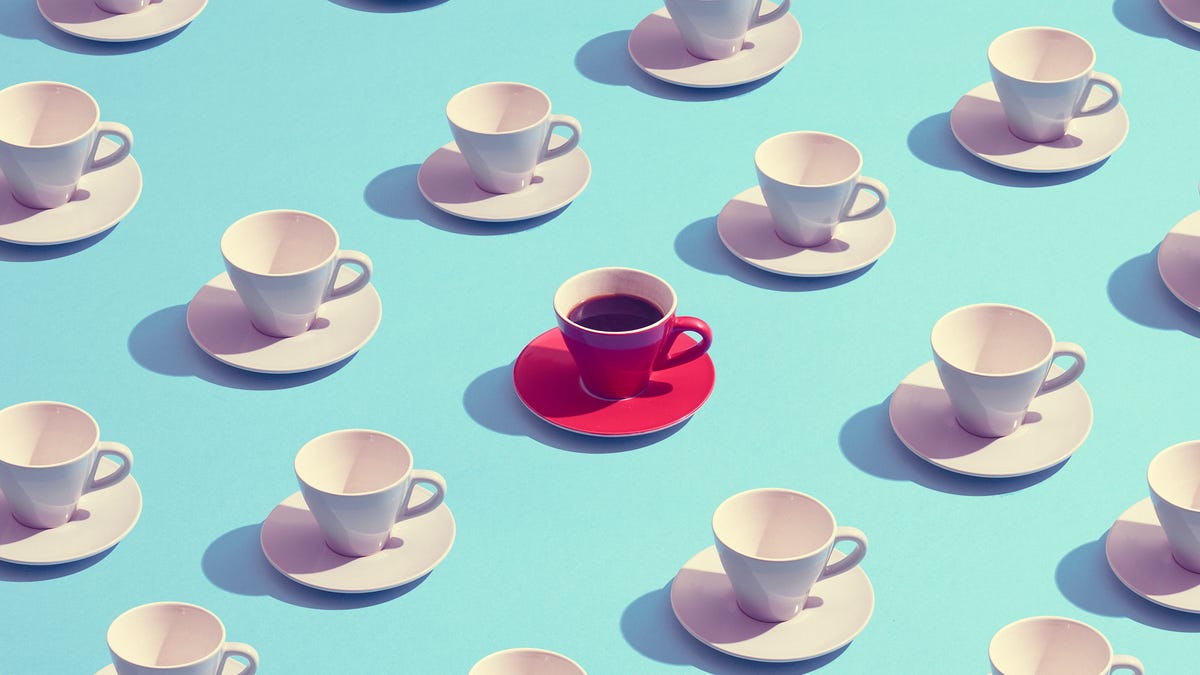Trying to Cut Back on Coffee? Here Are Some Tips
Reducing your daily caffeine intake can be difficult -- and downright unpleasant. Here are a few pointers to make your journey easier.

Many people start their mornings with a warm cup of something that'll give them energy. Giving up that precious relationship is no easy feat. In fact, if done hastily, it can be uncomfortable or even painful.
Given that caffeine is a drug -- specifically, the most popular psychoactive substance in the world -- you might experience some side effects or withdrawal symptoms if you're a regular tea, coffee, soda or energy drink consumer. Unlike withdrawal from other drugs such as alcohol or opioids, caffeine withdrawal is not typically considered dangerous, according to the US Food and Drug Administration.
But the side effects of quitting caffeine can be quite unpleasant.
According to the Cleveland Clinic, avoiding withdrawal symptoms is one of the most common reasons people continue their caffeine habit, which only kick-starts the dependency cycle all over again after you'd intended to break it. But with a few tweaks and tricks, you might just be able to alleviate or avoid the symptoms of caffeine withdrawal.
Here are some tips on how to cope.
Don't quit cold turkey
The consensus among health experts and scientists seems to be that it's best to wean yourself off caffeine by gradually reducing the amount you consume daily -- if you're able to, don't go from 100 to zero.
Stopping caffeine completely one day is the surest way to trigger withdrawal symptoms that include (according to the Cleveland Clinic):
- Headaches
- Tiredness
- Difficulty concentrating
- Nausea
- Muscle pain
- Irritability
In order to stave off those symptoms and change your habit, it's best to decrease your soda, coffee, tea or other caffeinated drink consumption through a period of two or three weeks, according to the Clinic. To do this, you may alternate between drinking regular coffee and decaf (do half regular and half decaf, for example), or cut back from three cups a day to two cups, then one.
If you're a soda drinker, start swapping in water or other cold beverages instead of your usual caffeinated pop, the Clinic suggests. If you're a tea drinker, experiment with less-caffeinated tea (which contains less caffeine than coffee in general).
Whether your go-to is a refreshing soda or a warm cup of coffee, caffeine can be a tough habit to quit.
Stay hydrated
This is a simple one, but important nonetheless. If you're on the brink of a bad headache you think might be due to your caffeine cut-back, try drinking a glass of water, then reprioritize your hydrating habits in general, because dehydration can also cause headaches, fatigue or symptoms similar to caffeine withdrawal. Drinking water with each meal and snack or taking sips while working from your desk, for example, are simple ways you can turn a coffee-drinking habit into a water-drinking habit.
Drinking water may be especially important in the mornings when you're used to reaching for a mug of coffee, but your body is dehydrated from last night's rest. Even if you're not cutting back on coffee, making water the first thing you reach for every morning is an easy way to start your day off on the right track.
Read about some other benefits of drinking more water.
Stay energized through good food and better sleep
Caffeine seduces by keeping us alert and awake, but there are other factors that influence how bright-eyed and ready to take on the day we feel. In addition to drinking more water, choosing more nutrient-dense foods and sleeping more (the average adult needs 7 to 9 hours a night) will make you feel more alert, according to a Healthline report.
All food has calories, which give us the energy we need to live, but some foods leave us feeling more energized than others. According to a report by CNET and Chowhound, some popular morning foods that leave you feeling energized sans-caffeine in the morning include chia seeds and raw cacao.
Eating more complex carbohydrates (whole grains, oats and starchy vegetables, for example) instead of simple carbs will also give you a more steady feeling of energy throughout the day, according to Healthline.
Know how much caffeine you're consuming
In addition to drinks like coffee, tea or soda, other foods, such as chocolate, preworkout formula or other supplements can contain caffeine, too. Before you officially quit caffeine, it's good to take an inventory of your weekly diet and see how much you've been consuming, exactly, and approach from there before you start calculating the best way to cut back.

